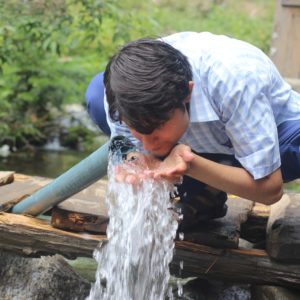It has been about a month since the UN-sponsored 2021 World Water Day (March 22). Let’s review what you learned about the global water crisis. Our review consists of one question. Where is clean water needed the most?
How would you answer?
- In the middle of the desert?
- In remote, rural regions?
- In the slums of major cities?
- In Africa?
- In areas plagued by drought?
- In refugee camps?
Any one of those is a good answer, but …
What is the right answer?
An insufficient amount of clean water is, without question, a global concern. The water crisis, however, is much more a personal crisis than it is a global crisis.
The clean water crisis is global only to the extent that access to clean water is limited in many places around the world. The real clean water crisis is personal.
An estimated 1.2 billion people lack access to clean water. That problem is so massive that it is hard to wrap our minds around it in a way that has a dramatic impact on us individually.
The irony is that it is at the individual level that a lack of access to clean water becomes a comprehensible threat.
We can understand a thirsty person begging for a cup of cold water. Only the most heartless among us would ignore such a person and their family. We would act on our own, moved by compassion to alleviate their thirst and the existential threat that failing to have clean drinking water would have. We would do something for them because we can.
What about the others?
What about the average woman in Africa who has to walk more than 3.5 miles every day to any viable water source? These women spend an estimated 40 billion hours fetching water for their families each year.
What about the 800+ children under the age of five who will die in the next 24 hours from diseases and diarrhea caused by drinking contaminated water?
What about the two billion individual people who use “a drinking water source contaminated with feces?”
What about the millions of individual people who live in a country that has neither enough clean water nor the financial resources to build the infrastructure to bring clean water to them?
Think in terms of those people as individuals.
All they want is all we would want if we were thirsty—a cup of cold water.
There is not a global water crisis. God gave us plenty of clean water to go around.
There are, however, millions of individual people all around the world who face a very personal clean water crisis.
What can we do?
If you or I suddenly had no access to clean water, it would be a crisis for us, regardless of who else did or did not have clean water.
If we are compassionate enough to provide a glass of clean water to one thirsty person, how many more could we help?
From a practical perspective, our personal reach is limited. On the other hand, there are 6.7 billion of us who do have access to clean water, many of whom are able to help fund clean water access programs. Together, we should be able to do something!
What will you do?
Think about it. But don’t stop there. Do something. Find out how you can assist local programs. Figure out how you can contribute to the multitude of NGOs and FBOs that are dedicated to providing clean water to individuals and entire communities that lack access.
What you decide to do will make a difference to someone who needs clean water most.
Five Faith-Based Nonprofits that Provide Clean Water Access
Click on the links to these websites to see how you can help to provide clean water for someone who is thirsty.
- Compassion International
- GFA World
- Hope of Life International
- Life Water International
- World Hope International
Read more news on the Clean Water Crisis and Faith Based Organizations on Missions Box.
Sources:
- UNICEF, Press Release, March 17, 2021
- Seametrics, 5 Countries Most Threatened by Water Shortages
- Conserve Energy Future, What Is Water Scarcity?
- International Business Times, 15 Disturbing Global Water Crisis Facts For World Water Day 2021





